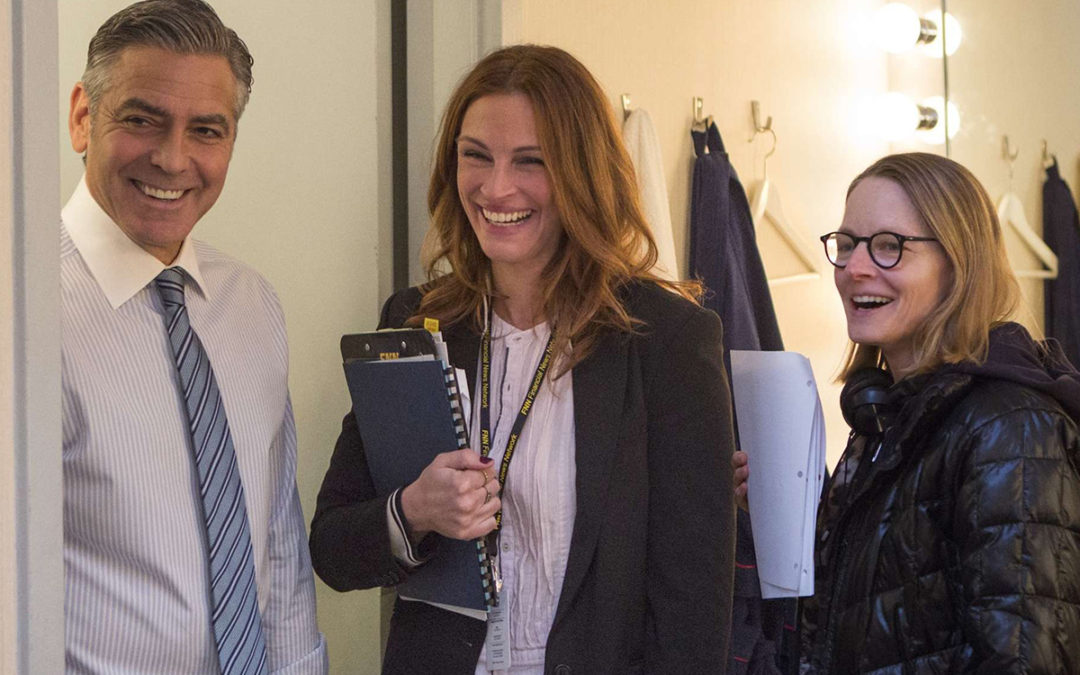Tri-Star Pictures. 2016. Thriller. 99 minutes.
Money Monster, the fourth film directed by Jodie Foster, fancies itself a ripped from the headlines wail from the bottom of the economic ladder, a thriller-cum-exposé about how Wall Street and big media suckered average Americans into following the Pied Pipers of TV’s financial punditry class over the cliff into economic ruin. However, the movie we’re really getting is the inevitable result of a script co-written by the guy who gave us National Treasure and Rush Hour: a serviceable, if increasingly far-fetched, B-movie hostage drama whose primary attribute is the competency of top-name talent who mistakenly think they’re contributing to the national dialogue by creating a liberating, shared experience for the little people.
This is near-heartbreaking when you consider that a true talent such as Jodie Foster has only directed three films previously. Yet it cannot be denied that the empathy and warmth that added such glow to Little Man Tate (1991) and Home for the Holidays (1995) has, following her noble failure The Beaver (2011), nearly abandoned her. In telling the story of an aggrieved everyman breaking into a live TV broadcast and threatening to kill the host, Foster is channeling whatever she learned acting in the thrillers Flightplan and Inside Man instead of acting for the likes of Martin Scorsese and Neil Jordan.
Not to discount those looking to Money Monster to help process their rage, but maybe the film is best appreciated as a love story between a TV host and his producer. We haven’t seen George Clooney and Julia Roberts on-screen together since Ocean’s Twelve (2004) and even in the context of a supposed white-knuckle drama where they hardly share the screen, their sophistication and fizzy banter make one dream of Cary Grant and Audrey Hepburn starring in a David Fincher thriller.
Roberts is completely credible as Patty Fenn, the calm and quick-thinking producer of FNN’s shtick-filled Money Monster financial advice program hosted by the charmingly smug Lee Gates (George Clooney, flashing star wattage, even if he’s too innately principled to fully convince as a prick). She keeps the show and its many elements flowing seamlessly while currying our favor with self-incriminating, anti-media sentiments like “we don’t do journalism, period,” a line that, no coincidence, earns Roberts her first close-up.
Lee trusts Patty completely: he barely glances at the documents she wants him to sign and during the live broadcast, she’s in constant communication with him via earpiece, correcting Lee’s mistakes before he makes them. And it’s one big mistake that gets the story rolling, a forgotten piece of bad, on-air advice that asks us to revisit emotions we’ve already processed and would rather relive as comedy – something The Big Short accomplished to Oscar-winning effect.
Lee’s fateful stock recommendation has resulted in financial disaster for Kyle (Jack O’Connell, when we’d really prefer the late John Cazale), whose lowly station is communicated almost entirely through his slathered New Yawk accent, which falls hard and thick as he breaks into the studio during a live broadcast of Money Monster carrying a gun.
He has also got a bomb-embroidered vest for Lee to wear while he gives reluctant audience to Kyle’s grievances. Lee’s only lifeline is Patty, trapped in the control room with the rest of the studio crew, calming him down via whispered IFB communiqués containing coded messages or strongly advised suggestions as to his next move.
Although we’re almost 10 years removed from the beginning of the financial crisis, the film can’t muster any more compelling argument for Kyle’s cause than the system is “rigged. The whole goddamn thing” and that rich TV guys like Lee turn financial advice-giving into a nightly circus where trustworthy counsel is incidental. Lee and Kyle’s back-and-forth jockeying for intellectual and negotiating position works as far as it goes, helped along by a pulsating but thankfully not overbearing Dominic Lewis score. And yet Money Monster isn’t content to be a self-contained battle of wills between a wealthy, fast-talking smart guy and the defeated everyman whose heart is filled with resentment and gutter wisdom.
Money Monster keeps getting bigger and more preposterous, until Seoul, Reykjavik, and Johannesburg have been looped in to suggest the issue’s international scope, as corporations conspire to dupe poor, unsavvy investors, gullible enough to place their financial fortunes in the hands of a TV host dressed in gold lamé pants and surrounded by Fly Girls.
Jodie Foster and her three screenwriters haven’t even the guts to fully indict the real villains (although in one sparkling and surprising moment, Kyle’s financial choices come into question). It’s the 1% of the 1% who are the bad guys here, a cop-out involving a fictitious company and its smarmy CEO. This allows everyone to feel victimized, even Lee. But what larger truth has been uncovered when corporate muckety-mucks argue over algorithms, like they’re in some straight to DVD thriller from 2002? What catharsis has been reached as incriminating video plays and punches fly in the film’s ridiculous conclusion?
If Money Monster truly teaches us anything, it’s that people should be more careful with their money. A good start is not buying tickets for films that think they’re indicting a corrupt system, but are actually painfully out of touch with real hardship.

